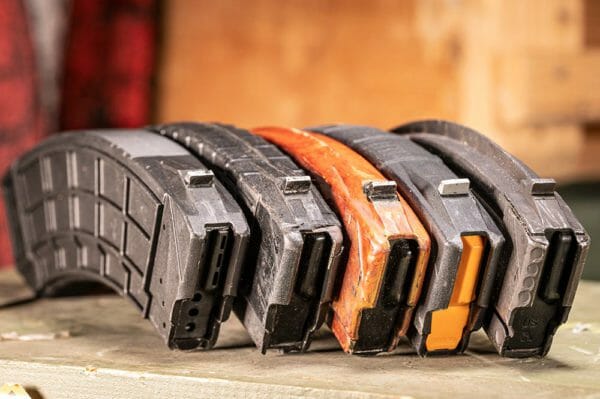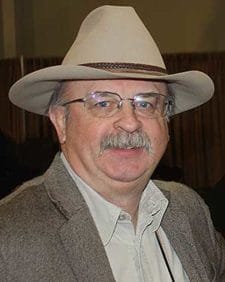
U.S.A. –-(AmmoLand.com)- Oregon state workers in the Secretary of State’s office have until Aug. 7 to confirm whether a gun prohibition activist group gathered enough valid signatures to put gun control Initiative Petition 17 on the November ballot, which gun rights advocate Kevin Starrett says will make it impossible for people to comply.
Starrett, who heads the Oregon Firearms Federation (OFF), spoke with Ammoland News via telephone. He said local law enforcement agencies with which he has spoken or communicated with via email “have any plans to provide for the mandatory (safety) classes.”
The measure, sponsored by “Lift Every Voice Oregon,” reportedly gathered nearly 160,000 signatures. It would outlaw so-called “large capacity magazines” and require Oregon citizens to obtain a permit to purchase a firearm, but only after going through a restrictive process that includes safety training by an instructor certified by a law enforcement agency. The training includes an “In-person demonstration of the applicant’s ability to lock, load, unload, fire and store a firearm before an instructor certified by a law enforcement agency.”
IP17, according to Starrett, will put a financial and logistical burden on sheriffs and police departments they will not be able to meet because of the requirement that applicants for a permit to purchase a firearm complete the training and background checks.
Requiring a permit to purchase could run into a constitutional challenge, same as did New York’s now-nullified “good cause” requirement to get a concealed carry permit.
The other problem with requiring a permit to purchase is that police agencies can become lethargic about approving purchase permit applications. A few years ago in New Jersey, that cost a woman her life.
Carol Bowne, a resident of Berlin Township, had applied for a purchase permit because she feared an ex-boyfriend. The local police agency dragged its feet and Bowne was brutally murdered in her driveway by the former boyfriend, who subsequently hanged himself.
Starrett also argues in an OFF communique that IP17 is “an overtly racist ballot measure” because minorities, who are apprehensive to approach law enforcement, will be reflexively discouraged from exercising their rights. Combined with the costs of a purchase permit and the training, if the measure becomes law, minorities and low-income Oregon citizens would be the first to suffer.
“That’s clearly the intention,” Starrett asserted. “To make it impossible.”
In the OFF newsletter, Starrett wrote, “The measure does not address who must, or can, provide live fire shooting facilities or what they may charge for their use. The Multnomah County Sheriff has stated they are “unable to speculate or comment on what MCSO will or will not be providing if this initiative becomes law.”
He added this: “But urban minorities will not be the only people who will find the legal purchase of a firearm almost impossible. Many smaller police departments and sheriffs do not have their own shooting facilities and rely on private gun clubs to train. Most rural sheriffs are grossly underfunded and undermanned. There is nothing in the measure that defines what is required to be “authorized” by law enforcement. But no matter who is approved, they will need access to a firing range to even begin this process.
“The personal information of anyone attempting to purchase a firearm will be collected in a publicly available database,” the OFF advisory said.
Starrett is also perturbed that Oregon media “are completely in the tank” with a bias favoring the initiative. One article, in Willamette Week by a reporter who rode in a school bus from Portland to Salem along with the gun control group, underscores Starrett’s media mistrust.
OFF on Friday issued a bulletin noting, “For each ballot measure to be voted on at the General Election, the explanatory statement committee is responsible for preparing an impartial, simple, and understandable statement explaining the measure, not to exceed 500 words. Upon completion of this task the statement is filed with the Secretary of State Elections Division, so that a public hearing on the statement may be scheduled. If a statement receives comments during the public hearing, the explanatory statement committee must meet to review comments and consider revisions to the statement.”
“For ballot measure 17, the gun ban ballot measure, the committee will include Elizabeth McKenna, Margaret Olny, and HK Kahng,” OFF said. “McKenna is one of largest donors and lenders to the measure. (The ACLU also donated $10,000.00.) Olny is a lawyer who regularly works for left wing causes.
“Kahng’s Linkedin page lists him as “Web developer and infrastructure wiz, eager to create, launch and nurture applications that help build organizations and communities by facilitating collaboration , streamlining processes and sharing knowledge,” OFF said.
Over the past several years, Oregon and neighboring Washington have become hotbeds of anti-gun political activity, at least along the I-5 corridors between Portland and Salem, and Seattle to Olympia. Gun owners, who have a history of lethargy when it comes to voting unless there is a ballot issue directly affecting them, will need to turn out big time south of the Columbia River if IP17 makes it onto the November ballot.
In Washington, there will not be any initiative measures on the ballot this fall, but that should not be taken as notice of surrender. Watch for a storm of activity in 2024 when the presidential election is bound to bring Northwest liberals out to vote.
About Dave Workman
Dave Workman is a senior editor at TheGunMag.com and Liberty Park Press, author of multiple books on the Right to Keep & Bear Arms, and formerly an NRA-certified firearms instructor.

from https://ift.tt/ClIgAnG
via IFTTT

No comments:
Post a Comment